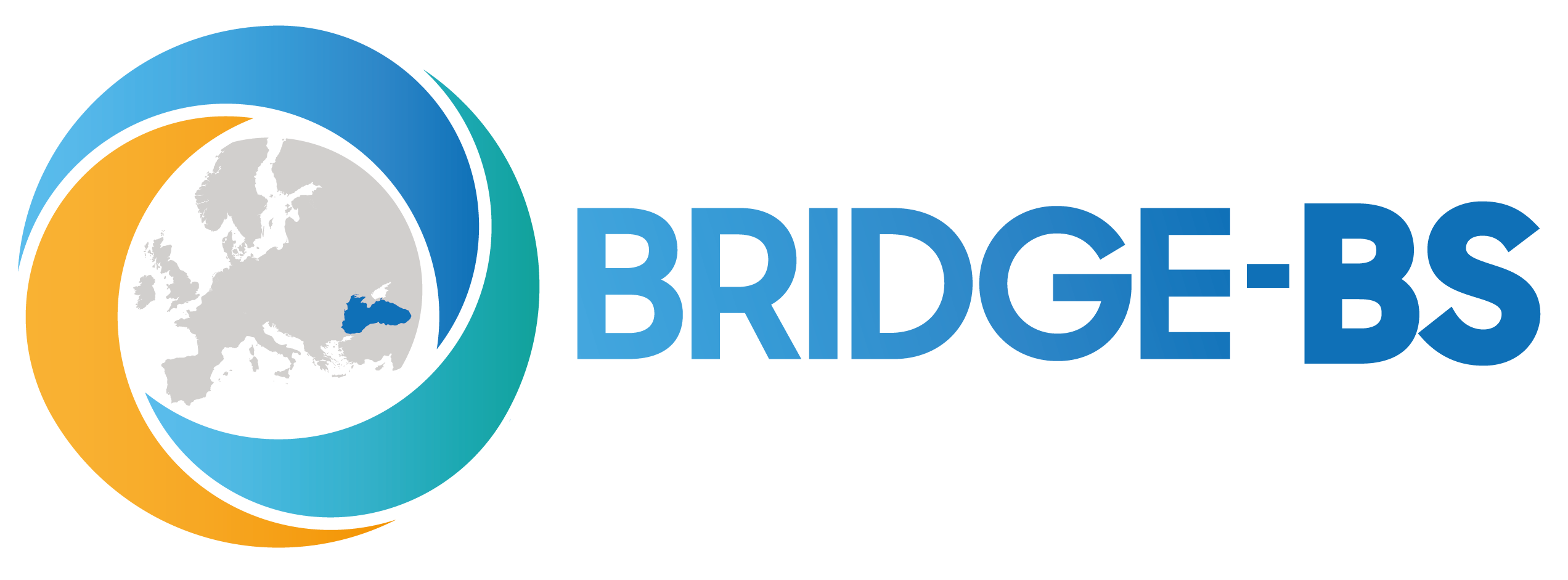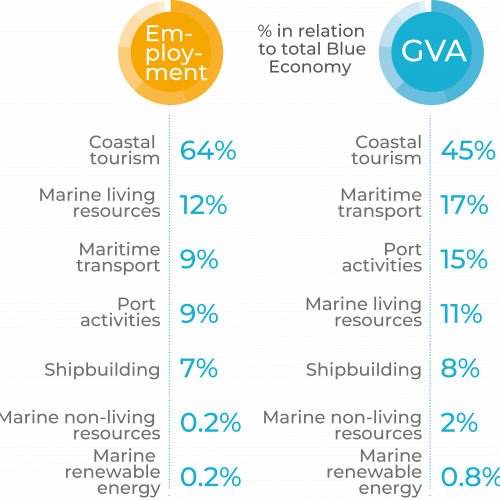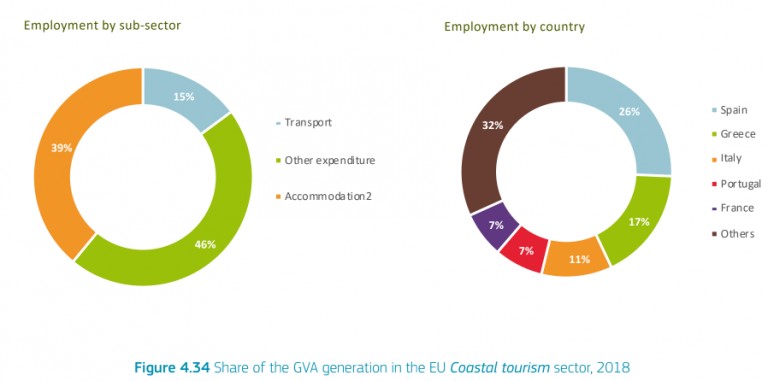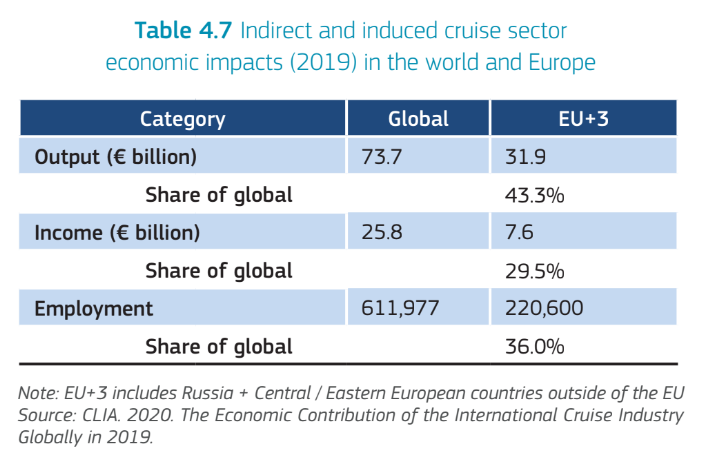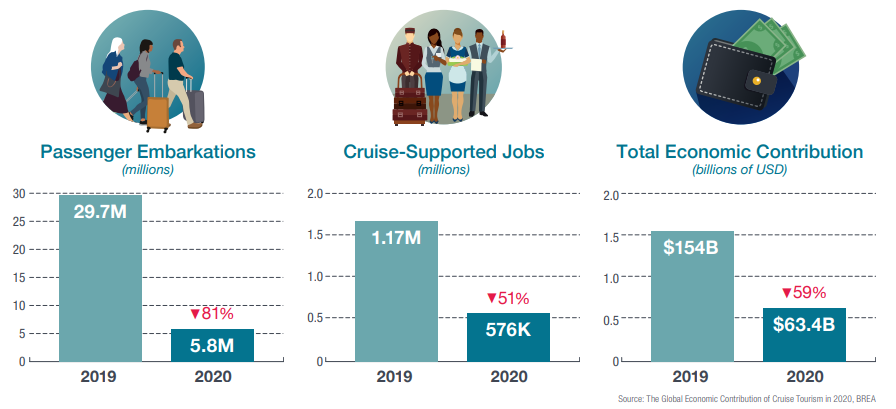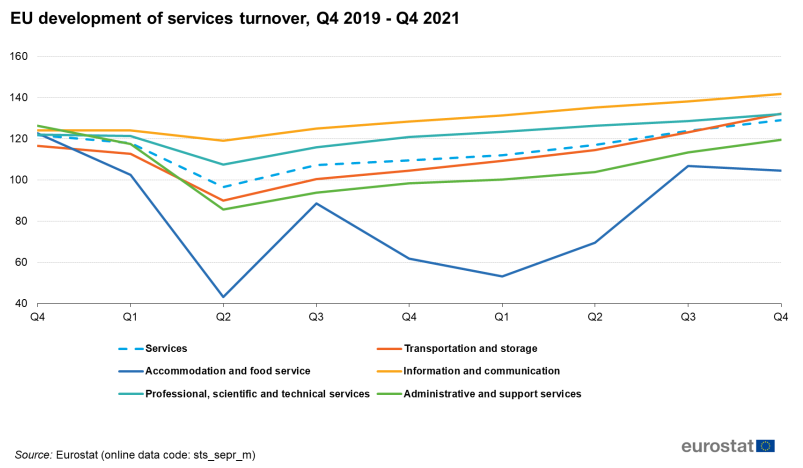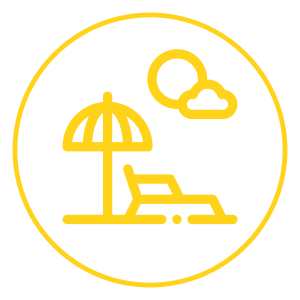
COASTAL AND MARITIME TOURISM
Tourism is one of the world’s largest industries, contributing trillions of dollars to the global economy and supporting the livelihoods of an estimated one in ten people worldwide.
Coastal and maritime tourism is the largest maritime activity in Europe and is closely linked to many other parts of the economy. It could be composited by location as coastal tourism and maritime tourism, by sub-sectors as beach-based and water-based or other.*
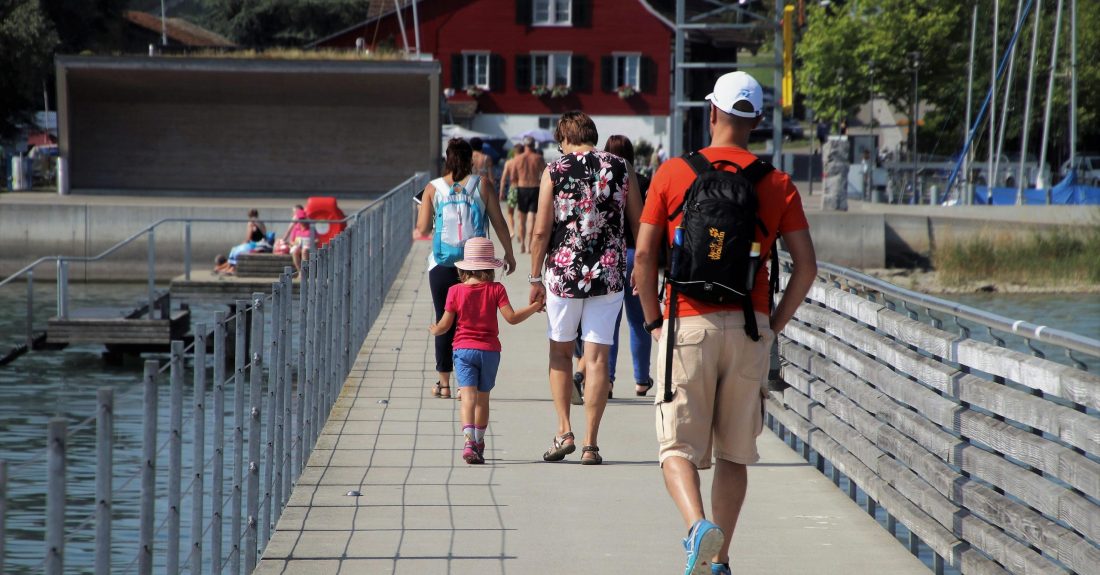
GENERAL INFORMATION
Coastal and maritime tourism employs more than 2.8 million people in 2018, and personnel costs reached €52.2 billion, up from €46.9 billion in 2009, amounting to an average wage of about €18 360 in 2018*. With anticipated global growth rates of more than 3.5%, coastal and marine tourism is projected to be the largest value-adding segment of the ocean economy by 2030, at 26%*.
SUB-SECTORS
The sub-sectors: Accommodation, Transport, and Other expenditures accounted for 64% of the jobs, 45 % of the GVA, and 41% of the profits in the EU Blue Economy in 2018*. More than 2.8 million people were directly employed in the sector in 2018 as Spain leads with 26% of the jobs and 30% of the GVA, followed by Greece, Italy, and France. Other expenditures generated over 1.3 million jobs, corresponding to 46% of the Coastal tourism direct employment, Accommodation employed 1.1 million persons (39%) and transport a further 422 850 jobs (15%)*.
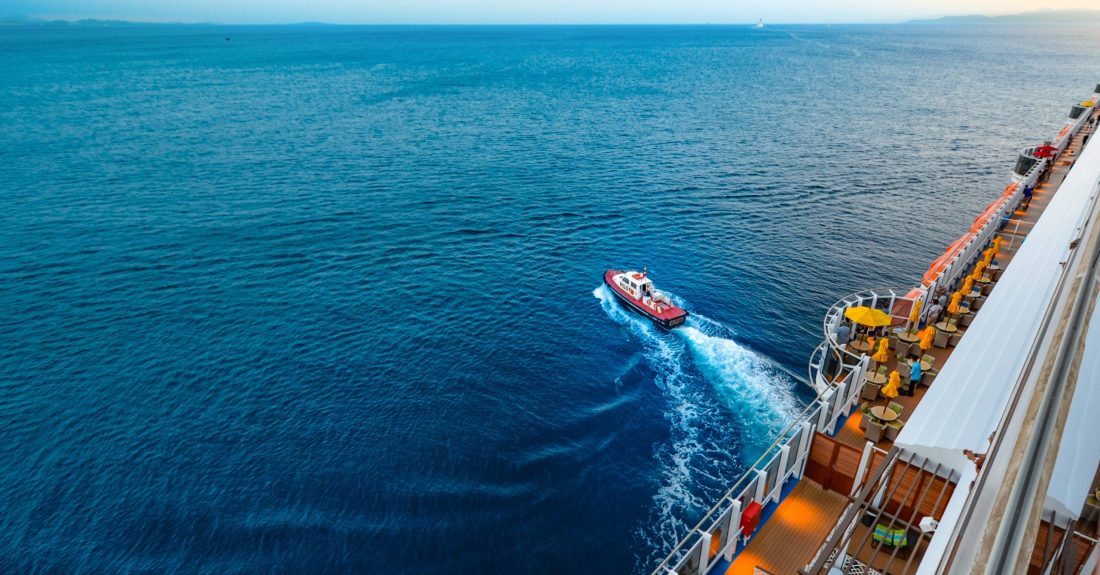
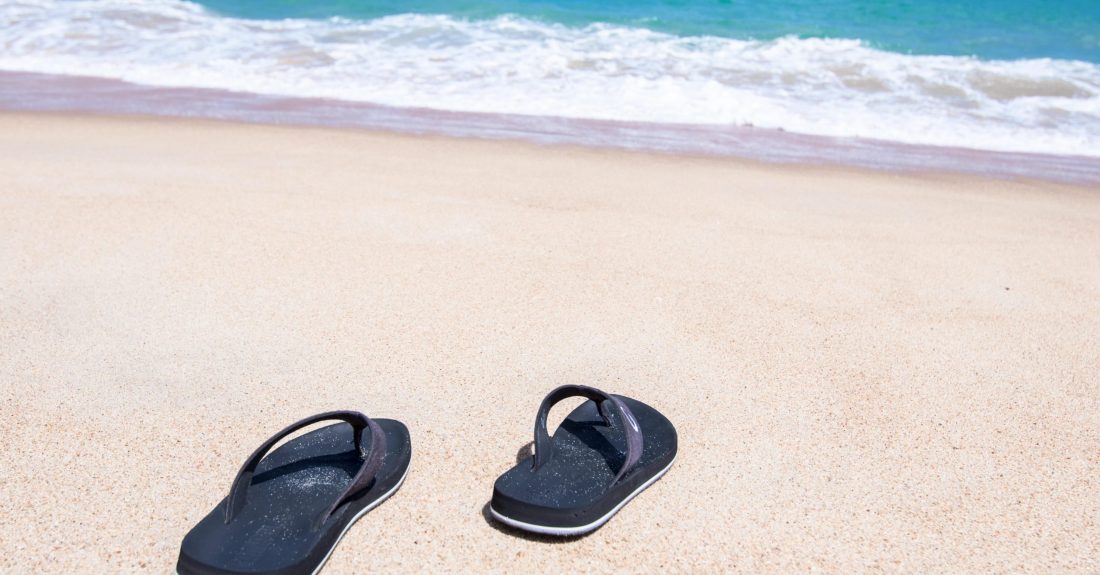
CURRENT STATUS
The impact of the COVID-19 crisis particularly affected countries heavily relying on Coastal tourism: Greece (-12% in overall GDP), Croatia (-10%), Malta, and Spain (both -9%). Due to strong reliance on air travel, these countries registered a decline in Coastal tourism whereas countries such as Denmark, Germany, France, the Netherlands, and Poland registered expected activity or exceeded it.
EXPLORE THE OPPORTUNITIES
Coastal tourism | |
Occupation | Description |
Hotel Manager | Hotel managers are responsible for overseeing the daily functions of a hotel. They hire new employees, create and implement hotel policies, work with vendors, and present data about the hotel's operations to the owners. Hotel managers usually need excellent customer service skills. They should be able to resolve difficult guest issues smoothly and efficiently. To communicate with guests, they need emotional intelligence so they can listen to and understand customers’ needs with ease. Hotel managers should have the ability to think critically and make informed decisions quickly. They not only do review and solve difficult customer issues, but they also must ensure each department operates smoothly to create a satisfactory guest experience. |
Hotel Operations Manager | Operations managers are responsible for improving the way a company operates. They hire new staff and create training standards for new employees. Operations managers may also write or edit HR documents to ensure they meet industry standards and regulations, manage budgets and meet with other companies to build beneficial relationships for their company. Many companies prefer operations manager candidates to have advanced degrees. A Master’s Degree in Business Administration or another business field like finance can help applicants be more qualified candidates for operations manager positions. |
Marketing Director | A marketing director develops a brand’s strategy, creates campaigns to improve brand awareness, and helps increase sales. Marketing directors lead marketing teams, guiding them to complete projects and meet marketing objectives. A marketing director has the following responsibilities: Identify customer trends and adjust marketing plans; Lead marketing teams to complete projects; Meet with marketing partners and vendors to fill in gaps; Allocate marketing budget across digital, print, and media platforms; Coordinate with operations and sales to meet company goals. |
Cruise ships | |
Deck and engine room staff ( reference to section Maritime transport, Shipping) | These are responsible for maintenance and, therefore, the safety of passengers. A lot of positions fall under this category, including: Captain/Master, Staff Captain, Safety Officer, Environmental Compliance Officer, Officers (1st, 2nd, 3rd), Chief Engineer, Staff Chief Engineer, Engineers (1st, 2nd, 3rd) Their roles are closely related to the vessel operations. Relevant education and certifications are required by the cruising companies. Roles will suit those with a degree and experience in navigation(deck staff) or engineering(engine room staff). |
Hotel Services Engineer | The Hotel Services Engineer is managing the entire hotel technical department of the cruise ship. He/ she is responsible for the maintenance and repair of all machinery, equipment, and systems outside the main engine room. |
Chief Electrical Engineer | The Chief Electrical Engineer/ Chief Electrician has the responsibility of overseeing the operation and maintenance of the electrical plant and associated electrical systems throughout the cruise ship. The Chief Electrician ensures that all electrical. |
Electronic Engineer | The Electronic Engineer is responsible for the maintenance and repair of all electronic equipment and systems aboard the cruise ship and works under the supervision of the Chief Electrical Engineer. The ship's equipment/systems maintained by the electronic engineer include (but are not limited to) electronic and navigation equipment on the bridge, satellite communication system, electronic equipment in the engine control room, ship's entertainment and TV systems including TV sets, ship's telephone system, telephone sets, and personal pagers, camera surveillance system, public address system, UPS systems, fire detection systems, fire, and water-tight doors control systems. |
IT staff | On-board information technology teams oversee and support all shipboard IT systems and operations. Roles suit those with a degree or experience in information technology. |
Managers | These positions are available with cruise companies both on land and at sea. These roles are ideal for those with experience or qualifications in business, management or leisure, travel or tourism management. |
Human Resources Manager | He/she oversees and manages the entire human resources division of the cruise ship with an emphasis on vital functions: training and development, performance management, conflict resolution, promotions, transfers, employee relations, employee turnover, berthing compliance, progressive discipline, time and attendance, benefits and compensation administration, policies, procedures, and regulatory compliance. |
Cruise Director | The Cruise Director is responsible for the entertainment department and supervises and evaluates the performance of all department personnel - Headline Entertainers, Production Show Cast Members, Stage Manager, Stage Staff, Sound and Light Technicians, Bandmaster, Musicians, Cruise (Activities), and Youth Staff |
No | Education/Specialty | Program | University | Country | City | Web page |
1 | International tourism business* | MSc | University of Economics -Varna | Bulgaria | Varna | |
2 | Economics and Management(Tourism) | PhD | University of Economics -Varna | Bulgaria | Varna | https://ue-varna.bg/en/p/8584/admission//phd
|
3 | Management in tourist destinations* | MSc | Sofia University “St. Kliment Ohridski” | Bulgaria | Sofia |
|
4 | Tourism,(Cultural Tourism, Ecotourism)* | MSc | Sofia University “St. Kliment Ohridski” | Bulgaria | Sofia |
|
5 | Recreation and Tourism Geography | PhD | Sofia University “St. Kliment Ohridski” | Bulgaria | Sofia | https://www.uni-sofia.bg/index.php/eng/education/phd_students/accredited_scientific_majors
|
6 | International Tourism* | MSc | The University of National and World Economy | Bulgaria | Sofia | https://www.unwe.bg/en/pages/11857/specialities.html
|
7 | Sea tourism Management * | MSc | Batumi State Maritime Academy | Georgia | Batumi | https://bsma.edu.ge/page/sabakalavro-saganmanatleblo-programebi#2
|
8 | Tourism and Hospitality Management | MSc | Shota Rustavelli State University | Georgia | Batumi | |
9 | Smart Urban Coastal Sustainability | Joint Master´s programme | Technical University of Civil Engineering Bucharest (EU-Conexus) | Romania | Bucharest | https://utcb.ro/en/eu-conexus/minor-programmes/coastal-development-and-sustainable-maritime-tourism/
|
10 | Smart Urban Coastal Sustainability | Joint Ph.D. Programme | Technical University of Civil Engineering Bucharest (EU-Conexus) | Romania | Bucharest | https://utcb.ro/en/eu-conexus/minor-programmes/coastal-development-and-sustainable-maritime-tourism/
|
11 | Master in Tourism Management and Planning | MSc | University Oradea | Romania | Oradea | https://www.masterstudies.com/Master-in-Tourism-Management-and-Planning/Romania/University-Oradea/
|
12 | Business Management in Tourism and Aviation | MSc | Romanian-American University | Romania | Brasov | https://www.rau.ro/find-a-ma-program/?lang=en |
13 | Master in Business Management in Trade and Tourism | MSc | Danubius University | Romania | Galati | https://www.univ-danubius.ro/en/facultatea-de-stiinte-economice/programe-de-master |
14 | Business Administration in Tourism and the Industry of Hospitality | MSc | Danubius University | Romania | Galati | https://www.univ-danubius.ro/en/facultatea-de-stiinte-economice/programe-de-master |
15 | Planning Of New Tourism Products And Destination Management | MSc | University Stefan Cel Mare | Romania | Siceava | https://feaa.usv.ro/programe-master/#
|
16 | Business Administration In International Hospitality And Tourism |
| University Stefan Cel Mare | Romania | Siceava | https://feaa.usv.ro/programe-master/managementul-firmelor-de-comert-turism-si-servicii/# |
17 | Tourism Planning and Development* | MSc | Babes Bolyai University | Romania | Cluj -Napoca | https://www.ubbcluj.ro/en/programe_academice/masterat/ |
18 | Business Administration in Tourism, Commerce, and Services* | MSc | Babes Bolyai University | Romania | Cluj -Napoca | https://www.ubbcluj.ro/en/programe_academice/masterat/ |
19 | Sustainable Tourism Management | MSc | Boğaziçi University | Turkey | Istanbul | http://www.boun.edu.tr/en_US/Content/Academic/Graduate_Catalogue/The_Institute_for_Graduate_Studies_In_Social_/Graduate_Program_In_Sustainable_Tourism_Management |
20 | Marine Tourism | Msc | Dokuz Eylul University | Turkey | Izmir | https://debis.deu.edu.tr/ders-katalog/2020-2021/eng/bolum_9577_eng.html |
21 | Marine Tourism and Yacht-Master Non-Thesis (Evening) | MSc | Dokuz Eylul University | Turkey | Izmir | https://debis.deu.edu.tr/ders-katalog/2020-2021/eng/bolum_9354_eng.html |
22 | Marine Tourism | PhD | Dokuz Eylul University | Turkey | Izmir | https://debis.deu.edu.tr/ders-katalog/2020-2021/eng/ |
23 | Tourism (sea and river) | MSc | Odessa National Maritime University | Ukraine | Odessa | https://onmu.odessa.ua/images/applic/pdf/Specialties%20of%20ONMU_2020
|
